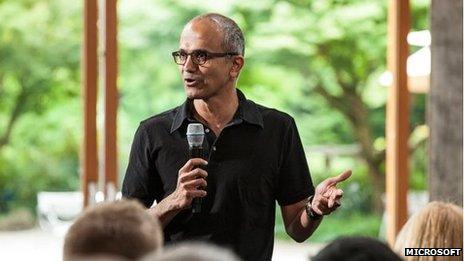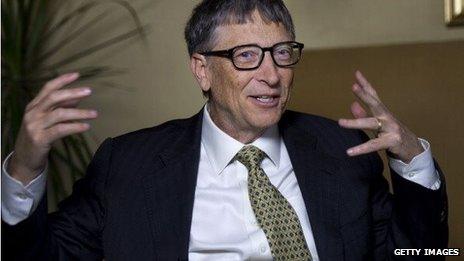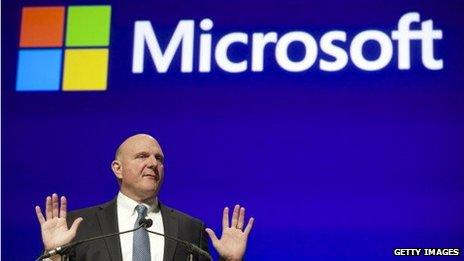Satya Nadella: Microsoft's new man at the top
- Published

Which way will the new boss take Microsoft?
After months of searching and speculation, Microsoft has a new chief executive - company veteran Satya Nadella.
The Indian-born technology executive is now tasked with leading a company which has been dominated by the names Bill Gates and then Steve Ballmer since it was founded in the 1970s.
It is a company which is still the world's largest software firm - but has in the past decade seen keen rivals loom into view - and share-price fluctuations shake investor confidence at times.
Many consumers have preferred Apple products in recent years, edging out some of Microsoft's market share.
Safe bet?
Steve Ballmer was chief executive from 2000 - succeeding Bill Gates. He is perhaps best-known for his sometimes flamboyant presentation style, proclaiming in his famous speech from the year he took up the role, "I love this company."
But what about the new man?

Satya Nadella is a Microsoft insider
Mr Nadella was born in 1967, he is an electrical engineering graduate from Mangalore University - and has postgraduate degrees in computer science and business.
He joined Microsoft in 1992 having previously worked for Sun Microsystems.
Since mid-2013 he has been running the company's cloud computing and business platforms. Cloud computing has become increasingly important to software companies, as people connect to the internet with many different kinds of devices - mobiles and tablets - and share resources, and files online.
'Inevitable choice'
Paul Kedrosky managing partner at SK Ventures, a Californian venture-capital firm, says that Mr Nadella was the "inevitable choice" for the role of chief executive.
"Most outsiders either lacked industry insight, or were smart enough to realise this was a near-impossible job," he says.
Mr Kedrosky says that Mr Nadella has a "high profile inside the company, and is liked and respected outside".

Many think Microsoft needs to speed up in its race with Apple for desirable products
He adds that his experience in developing the cloud at Microsoft has been significant, and will be "hugely significant" in future for the company.
Rupert Goodwins, technology expert and journalist, agrees - and says that this is a "very significant and potentially company-saving appointment.
"Nadella is a cloud man. He'll have a chance of weaning Microsoft off its addiction to expensive licensing fees for software that people don't actually want (although they have to use). To be fair, Microsoft has been going in that direction, but reluctantly and with a lot of internal empire wars."
He has, says Goodwins, a good reputation for being "top notch intellectually and very talented technically".
What about the issue of him being a Microsoft insider through-and-through?
Mr Goodwins considers it to be a debate which has become "overblown".

Bill Gates, co-founder of Microsoft, was involved in the search for the new boss
However, he says: "The classic outsider-saves-the-company story is that of Lou Gerstner, who turned IBM around when he came in from Nabisco. But the two companies aren't exactly parallel, and their problems aren't as similar as they may appear. Microsoft does know what to do, on some level, which IBM didn't, and Nadella is totally tuned-in to the future of corporate computing."
Colin Gillis, a technology analyst at BGC in New York says that some investors will be unhappy with the lack of radical change.
"They could use some fresh blood," he says.
"But he knows the company - he may wind up being more aggressive than people think - and the company should have announced a new appointment in the New Year, but nobody else worked for the role."
So what does Mr Kedrosky make of the whole process of replacing Microsoft's boss?
"The CEO search took so long for a few reasons," he says.

Steve Ballmer, former chief executive at Microsoft, was famous for his enthusiastic presentation style
"First, it's a tough job in a complex company. Second, there were insiders involved, Gates in particular, which made many candidates nervous that they wouldn't be able to effect as much radical change as they might like without interference. Third, the company wasn't really sure what it wanted. A pure operator? A visionary? An outsider? An insider?
"All of these were considered crucial at various stages, and all were eventually discarded as the list of candidates shrank and the search length became embarrassing. We are finally back to where we should have been in the first place: choosing the right candidate, which they have -- and it will be still be very, very difficult for him."
- Published4 February 2014
- Published4 February 2014
- Published24 January 2014
- Published21 January 2014